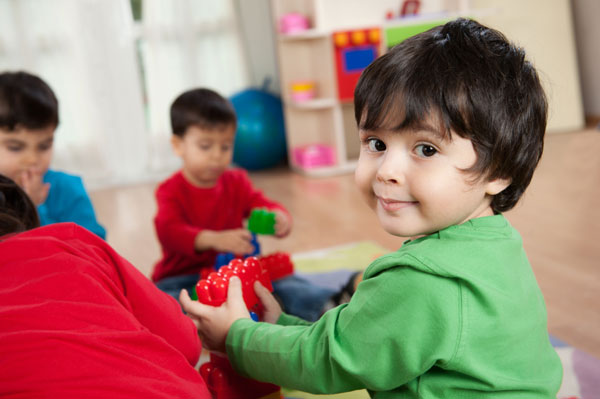
Preschool separation anxiety
Some preschoolers experience separation anxiety in one form or another. Typically, separation anxiety will not happen on the first day or during the first week. It’s usually once your child realizes he will be staying at preschool all day, for multiple days in a row, that it begins. Here are some tips to help ease and reduce separation anxiety while still reassuring your child.
- Practice now by dropping your child off at a friend’s house for short periods of time. Then gradually increase the time away from your child.
- Calmly and efficiently reassure your child that you will return.
- Give hugs and kisses, but don’t prolong the goodbye process.
- Once you leave, do not immediately return. If you forget something in the car, take it to the office to give to your child’s teacher.
- Ask that the office call you with an update or ask what their policy is on notifying parents after a difficult drop-off.
10 Things our kids' preschool teachers want us to know >>
Implement and maintain a preschool routine in the home
Call your child’s new preschool to find out their daily routine for the fall. If you can implement a similar routine at home, your child will go into his or her new preschool environment with a better sense of security and consistency. While you don’t have to structure your day to match the school’s schedule perfectly, you can plan snack, lunch time, outside play and nap or rest time at or around the same time as the school to help familiarize your child with the pattern of what’s to come.
Preschool prep at home
Preschool helps a child’s cognitive development and fine motor skills. To enhance your child’s cognitive development, encourage play through exploration and imagination. Preschool-aged children learn by doing and, in turn, they work to master fine motor skills, coordination and dexterity.
 Preschool prep play ideas
Preschool prep play ideas
- Play with Play-doh to create letters, numbers and shapes.
- Go on a nature walk to locate and label trees, rocks, sticks and birds.
- If your child has an interest in trains, visit a museum or train station.
- Stack wooden blocks or nesting blocks to make towers, bridges and buildings.
- Practice drawing and coloring on blank paper and with coloring books.
- Sing and dance to music.
- Plan a tea party complete with pretend or real foods and practice pouring water into cups.
Prepare your child emotionally for preschool
Young children can and often do experience anxiety in new situations — especially when they realize they are returning to preschool consistently and staying for a long period of time.
 Tips to emotionally prepare your child for preschool
Tips to emotionally prepare your child for preschool
- Associate preschool with positive, light conversations and spend a few minutes each day talking about it with your child.
- You may feel emotional about your child starting preschool, but try not to let your child see your emotions.
- Allow your child to pick out his or her own backpack and lunchbox for preschool. If your child has a hard time deciding, select two and let your child pick the final one. This fun Skip Hop Zoo Pack backpack pictured here is perfect for preschoolers. It's available comes in 17 styles and is priced at just $20.
- Get duplicates of your child’s favorite items to keep at school. If your child naps with a special blanket at home, make sure you have a duplicate or travel version to keep at the preschool.
Tip: Consider bringing the same crib sheets for your child’s cot, pillow case and a copy of your child’s favorite book.
Preschool story time: 5 Classic must-reads >>
Expect and prepare for some changes
Your child will be coming home from preschool physically, mentally and emotionally stimulated and may express these changes different ways and through different behaviors. He may need an earlier bedtime, an extra afternoon snack or increased cuddle time with Mom and Dad to help calm his senses. Night terrors and separation anxiety can and often occur during the first few months of preschool due to a child being overtired and from prolonged separation from parents. If they persist, contact your child's doctor for advice.
More on preschool
Finding fun preschool activities in your community
Counting games for preschoolers
Building brains with building blocks: The importance of kinesthetic play